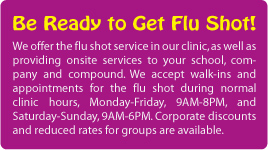
Thinking about getting a flu shot or influenza vaccine this year? The influenza vaccine is the best way to prevent the flu, and flu prevention should be a goal for everyone.
According to the CDC, about 5% to 20% of Americans get the flu each year. More than 200,000 people are hospitalized, and about 36,000 people die. These statistics would decrease if more people took advantage of the opportunity to prevent flu with an influenza vaccine or flu shot.
When should I get a flu shot?
Because flu season may begin as early as October and run through May, the best time to get a flu shot is in October or November. You can still get an influenza vaccine in December or later, but earlier may be more beneficial in preventing flu.
What types of flu shots or influenza vaccines are available?
There are two types of flu shots or influenza vaccines available for children and adults.
The first kind is the traditional flu shot. The flu shot does not contain a live virus and cannot cause the flu. This influenza vaccine is an inactivated virus that is given with a needle.
The other kind is a nasal influenza vaccine called FluMist. This influenza vaccine contains weakened viruses, which usually do not cause illness but sometimes can cause runny nose, congestion, and fatigue. The nasal influenza vaccine is recommended only for non pregnant, healthy people, ages 2 years to 49 years.
How does the flu shot or influenza vaccine work to prevent flu?
Both the flu shot and FluMist -- the influenza vaccines -- work by causing antibodies to develop in your body. These antibodies provide protection against infection from the flu virus. This antibody reaction may cause fatigue and muscle aches in some people.
Each year, the flu vaccine contains several different kinds of the virus. The strains chosen are the ones that researchers predict are most likely to show up that year. If the choice is right, the vaccine is 70% to 90% effective in preventing the flu in healthy people under 65 years of age.
|
|
Who should get the flu shot?
An annual flu shot is recommended for anyone who wants to reduce his or her chances of getting the flu. The flu shot is highly recommended for certain high-risk individuals who are more prone to flu complications, such as pneumonia. Those at risk for complications include people 65 or older, people with chronic medical conditions (such as asthma, diabetes or heart disease), pregnant women, and young children. People who should get vaccinated each year are:
• All children 6 months to 18 years old
• People 50 years or older
• Women who will be pregnant during the flu season
• People who live in nursing homes
• Adults with chronic heart or lung conditions, including asthma, or with any condition that weakens the immune system
• Household contacts and caregivers of any children younger than 6 months of age (these children are too young to receive the flu vaccine)
• Any person in close contact with someone in a high-risk group, such as health care workers and household contacts
Who should not get the flu shot?
According to the CDC, you should not get a flu shot or influenza vaccine if
• You have had an allergic reaction to a flu shot in the past
• You have an allergy to eggs
• You have previously developed Guillain-Barre syndrome within 6 weeks of getting a flu shot (Guillain-Barre syndrome is a disorder in which the body's immune system attacks part of the nervous system.) What are some of the side effects of the flu shot?
You may experience soreness and/or swelling in your arm after getting a flu shot. Some people have cold-like symptoms, including sniffles, headache, runny nose, sore throat, cough, and body aches for a day or two after getting the flu shot. In some cases, you may also experience a low-grade fever.
It is important to note that the benefits of getting a flu shot far outweigh the risk of flu shot side effects.

Please contact Jasmine Zhu at (021) 5879-9999 ext. 2862 or email marketing@seimc.com.cn for detailed information. |
